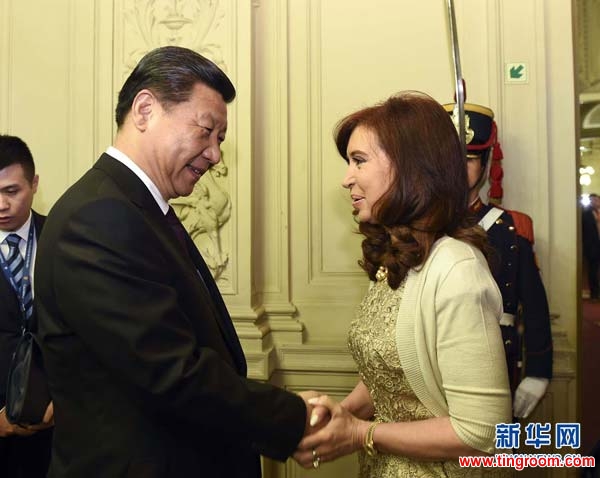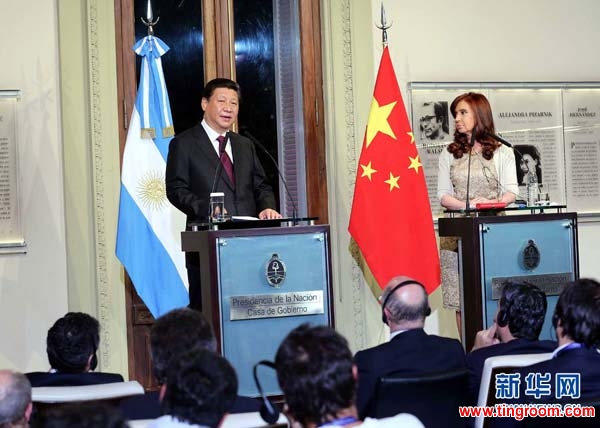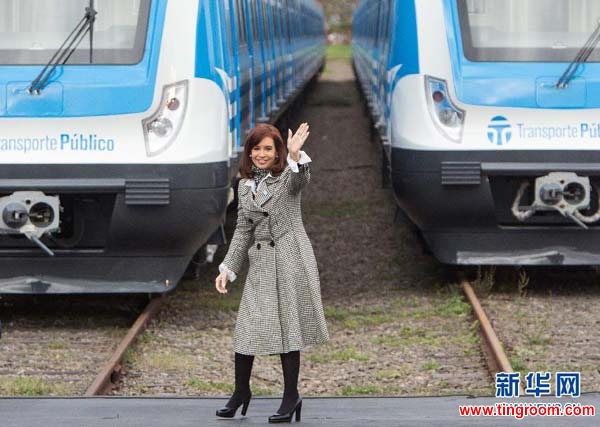-
(单词翻译:双击或拖选)
Full coverage1: China’s Leaders
China has become Argentina’s second largest trading partner and a major source of investment. Argentina is China’s fifth largest trading partner in Latin America. The relation is further fueled by the major economic agreements signed on Friday in Buenos Aires, including the financing by the Beijing government of two hydroelectric dams in the South American country.
 bilateral2 ties to a comprehensive strategic partnership3. (Xinhua/Li Xueren)" />
bilateral2 ties to a comprehensive strategic partnership3. (Xinhua/Li Xueren)" />
Chinese President Xi Jinping (L) shakes hands with Argentine President Cristina Fernandez de Kirchner during a welcoming ceremony before their talks in Buenos Aires, Argentina, July 18, 2014. Xi and his Argentine counterpart, Cristina Fernandez de Kirchner, agreed here Friday to upgrade bilateral ties to a comprehensive strategic partnership. (Xinhua/Li Xueren)
Chinese President Xi Jinping (L) shakes hands with Argentine President Cristina Fernandez de Kirchner during a welcoming ceremony before their talks in Buenos Aires, Argentina, July 18, 2014. Xi and his Argentine counterpart, Cristina Fernandez de Kirchner, agreed here Friday to upgrade bilateral ties to a comprehensive strategic partnership. (Xinhua/Li Xueren)
It’s been ten years since Argentina and China first signed a strategic alliance which has now continued to strengthen both their economies and trade. The arrival of China’s President Xi Jinping in Buenos Aires consolidates4 that alliance and brings fresh investment to key areas in Argentina.
With more than two-billion dollars of financing, China is providing trains and materials for Argentina to revamp its ailing5 railway service and there is also investment in other key infrastructure6 projects.
"Argentina is in a partnership with China in the making of an energy project here in Argentina where Chinese companies put money, Argentina puts in knowledge for this energy venture in the south of the country," Nicolas Tereschuk, political analyst7 said.
China will loan Argentina nearly five-billion dollars for the construction of two hydroelectric dams in Patagonia, which will bolster8 Argentina’s energy production. The project will take the name of Jorge Cepernic, a former governor, but also Nestor Kirchner, the late former president who promoted the special alliance with China back in 2004.
Chinese investment and trade with Argentina is diverse. With one of the largest shale9 oil and gas reserves in the world, and also as one of the largest soy producers, Argentina also has plenty to offer.
"At the start of the 1990s, China exported soy and oil. Now it doesn’t have enough soy and oil to supply its own demand, and is the main importer of soy and oil. So Argentina is the third most important for not only soy, but also soy derivatives10, and China is the main client," Gustavo Girado, Asia Y Argentina consultant11 said.
The relationship between Argentina and China continues to grow. In 2013, trade between the two reached 15 billion dollars. This state visit continues to develop a partnership that stretches across sectors12 such as energy, agriculture and banking13 - sectors that are vital for both countries.
During the trip, Xi also signed a three-year agreement for an $11 billion swap14 operation between the central banks of Argentina and China. This will let the Latin American country pay for Chinese imports with the yuan currency.
 joint15 press conference with Argentine President Cristina Fernandez de Kirchner after their talks in Buenos Aires, Argentina, July 18, 2014. Xi and his Argentine counterpart, Cristina Fernandez de Kirchner, agreed here Friday to upgrade bilateral ties to a comprehensive strategic partnership. (Xinhua/Liu Weibing)" style="margin: 0px; padding: 0px; border: 0px none;" />
joint15 press conference with Argentine President Cristina Fernandez de Kirchner after their talks in Buenos Aires, Argentina, July 18, 2014. Xi and his Argentine counterpart, Cristina Fernandez de Kirchner, agreed here Friday to upgrade bilateral ties to a comprehensive strategic partnership. (Xinhua/Liu Weibing)" style="margin: 0px; padding: 0px; border: 0px none;" />
Chinese President Xi Jinping (L) attends a joint press conference with Argentine President Cristina Fernandez de Kirchner after their talks in Buenos Aires, Argentina, July 18, 2014. Xi and his Argentine counterpart, Cristina Fernandez de Kirchner, agreed here Friday to upgrade bilateral ties to a comprehensive strategic partnership. (Xinhua/Liu Weibing)

With more than two-billion dollars of financing, China is providing trains and materials for Argentina to revamp its ailing railway service and there is also investment in other key infrastructure projects.
 收听单词发音
收听单词发音
1
coverage

|
|
| n.报导,保险范围,保险额,范围,覆盖 | |
参考例句: |
|
|
|
2
bilateral

|
|
| adj.双方的,两边的,两侧的 | |
参考例句: |
|
|
|
3
partnership

|
|
| n.合作关系,伙伴关系 | |
参考例句: |
|
|
|
4
consolidates

|
|
| 巩固 | |
参考例句: |
|
|
|
5
ailing

|
|
| v.生病 | |
参考例句: |
|
|
|
6
infrastructure

|
|
| n.下部构造,下部组织,基础结构,基础设施 | |
参考例句: |
|
|
|
7
analyst

|
|
| n.分析家,化验员;心理分析学家 | |
参考例句: |
|
|
|
8
bolster

|
|
| n.枕垫;v.支持,鼓励 | |
参考例句: |
|
|
|
9
shale

|
|
| n.页岩,泥板岩 | |
参考例句: |
|
|
|
10
derivatives

|
|
| n.衍生性金融商品;派生物,引出物( derivative的名词复数 );导数 | |
参考例句: |
|
|
|
11
consultant

|
|
| n.顾问;会诊医师,专科医生 | |
参考例句: |
|
|
|
12
sectors

|
|
| n.部门( sector的名词复数 );领域;防御地区;扇形 | |
参考例句: |
|
|
|
13
banking

|
|
| n.银行业,银行学,金融业 | |
参考例句: |
|
|
|
14
swap

|
|
| n.交换;vt.交换,用...作交易 | |
参考例句: |
|
|
|
15
joint

|
|
| adj.联合的,共同的;n.关节,接合处;v.连接,贴合 | |
参考例句: |
|
|
|

















